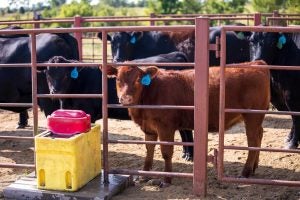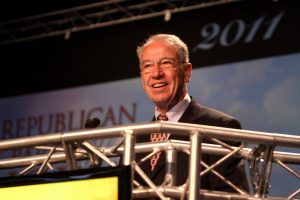In 2018, California voters passed Prop 12, more formally known as the Farm Animal Confinement Initiative. Prop 12 is a bill that eliminates gestation crates for sows and demands specific space requirements for veal sows and egg-laying hens. While challenged in the U.S. Supreme Court in 2023, to the dismay of many animal producer groups, and farmers across the country, it was upheld and is to become effective January 1, 2024.
The issue with it all, besides some politicians and voters not understanding the management purpose of gestation crates and space requirements, is that California somehow gets to dictate how other states farm, and can refuse products from producers who don’t follow the stringent laws.
But, through the farm bill renegotiations, some politicians are fighting back.
Sen. Roger Marshall, M.D., alongside Sens. Chuck Grassley, John Cornyn, Tom Cotton, Deb Fischer, Kevin Cramer, Joni Ernst, Eric Schmitt, Ted Budd, and Bill Hagerty, introduced legislation that would counteract Prop 12, giving other states freedom from interference by other state laws, and upholding state’s rights in regards to their local agriculture jurisdiction. Appropriately named the EATS Act (Ending Agriculture Trade Suppression), this law would prevent states with strict requirements from also enforcing their laws on outside states.
On Marshall’s website, background for the EATS Act states:
“The Commerce Clause of the Constitution of the United States provides the federal government with the duty to regulate interstate commerce. Consistent with that duty, this bill prevents states from impeding Ag trade from other states within the U.S. States should have the power to command their own destiny when it comes to agriculture production practices. And this bill preserves the right of State and Local units of government to regulate farming and ranching within their own state.
“Oftentimes these laws only increase the cost of production which will increase food costs for the food insecure and can also negatively impact an agricultural producer’s bottom line. Increased regulations and costs to value added food companies typically pass the costs on to the consumer. Sometimes these laws directly impact the production of animals forcing producers to bear the brunt of the increased cost of production without an increase in commodity prices.
“The United States is constantly faced with non-tariff trade barriers from protectionist countries, hurting American agriculture’s access to new markets. The last thing we need is a big state like California imposing its will on ag-heavy states like Kansas with regulations that will also restrict our ability to trade among the states,” said Senator Marshall. “This is a matter of state’s rights. If California wants to regulate agriculture in its own state, that’s fine, but California’s rules should not apply to Kansas, whose legislatures never approved of these regulations.”
Animal organizations are also backing this legislation.
“KLA appreciates Senator Marshall’s leadership on this issue,” said Kansas Livestock Association President Shawn Tiffany. “After the recent Supreme Court decision in National Pork Producers Council v. Ross, Congress must act pursuant to its enumerated constitutional authority to ensure commerce between states involving agricultural products can continue uninterrupted. Beef, dairy, and pork producers in Kansas should not be forced to accommodate a patchwork of radical, unscientific state and local standards of production.”

But, it’s not just animal and meat industries that could be affected, it can also negatively impact the delicate balance that crops and animals play in our food supply.
“KCGA supports the Kansas Senator Roger Marshall’s EATS Act, a common-sense bill that ensures open trade for ag products,” KCGA CEO Josh Roe said. “Kansas Corn advocates for free trade and elimination of trade barriers around the world, and this act would make sure we don’t encounter trade issues for our ag products within the boundaries of our own country. The EATS Act protects agricultural producers by prohibiting state and local regulations that could create trade barriers for U.S. ag products,” said the Kansas Corn Growers Association.
It isn’t just Kansas that will suffer from an overreaching law like Prop 12. Other states that produce commodities and send them to California will be impacted, including Iowa, which produces over 30 percent of the nation’s pork supply and is the leader in this space.
During his weekly public affairs program, Iowa’s Grassley stated, “They basically said you can’t market any pork in California, and that’s 15 percent of the national market, unless you have sow farrowing pins that are at least 24 square feet. In the United States, our farrowing stalls are smaller than that because we don’t want the sow to lay on her baby pigs and kill them. So, we wouldn’t be able to market our pork.”

The 2018 farm bill runs out at the end of September, and, although that is extremely close and neither the House nor the Senate have their farm bill texts published yet, there aren’t plans to extend the current bill. According to Grassley, House members will have a text ready by September, but the Senate is taking more time.
Sen. Debbie Stabenow “said she didn’t think we could get it done by September 30 when it needs to be done, but it could be done by the end of the year,” Grassley said. “Then I had a follow up question on whether we’d need a one-year extension of the 2018 farm bill and she said she didn’t think so — that’s very important.”
Currently, Congress is in recess until August 14, at which time Ag Committee Chairman Glenn “GT” Thompson (R-PA) has claimed it will be more aggressive toward finalizing a new farm bill before the expiration date.
Markie Hageman Jones majored in agribusiness at Fort Hays State University. She is actively involved in her state Cattlemen’s Association, Young Farmers chapter, and National Cattlemen’s Beef Association. Her AGDAILY.com articles can be found here.



